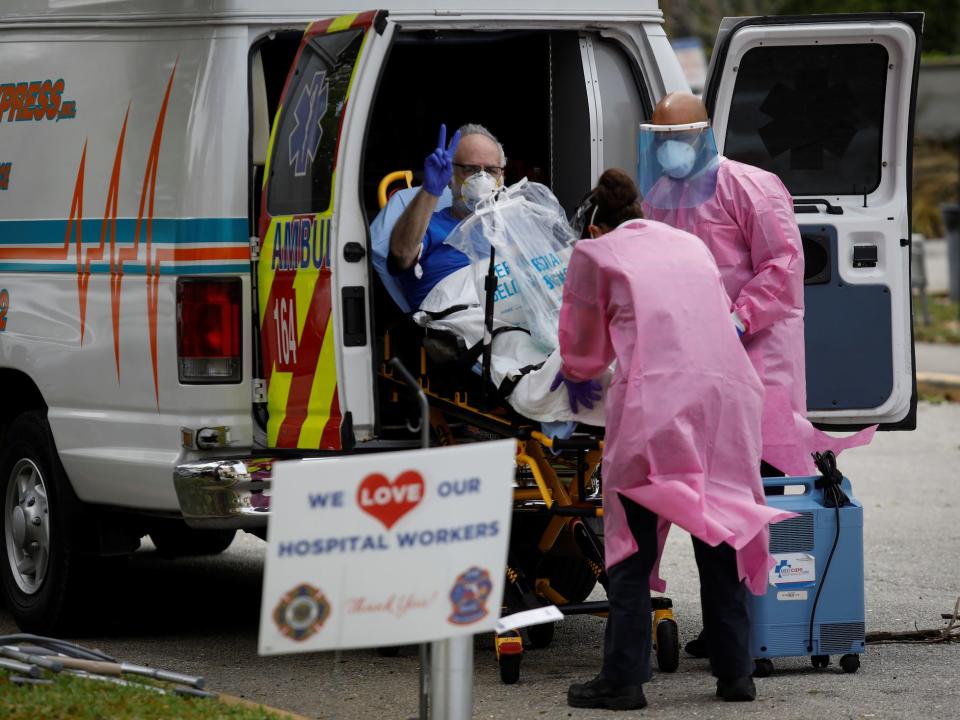New evidence suggests the coronavirus was likely spreading in the US and France as early as December

David Santiago/Miami Herald/Tribune News Service via Getty
New evidence suggests that the coronavirus was spreading around the globe as early as December.
In Florida, at least 170 COVID-19 patients reported symptoms from December 31 to February 29, according to the Miami Herald.
In France, a man arrived at a hospital outside Paris coughing up blood in late December. His sample later tested positive for the coronavirus.
New evidence from Florida and France suggests that the coronavirus had already spread out of Wuhan, China, and begun traveling across the globe as early as December.
The findings come as researchers test samples from patients with respiratory illnesses who went to hospitals in December, January, and February. The results suggest the virus could have begun spreading through communities outside China weeks earlier than previously realized.
"It's really important that we look further into this," Maria Van Kerkhove, the World Health Organization's COVID-19 technical lead, said in a press briefing on Wednesday. "Some countries may look backwards and may look at some of those samples that were stored in January or in December and may retest those. So it's possible that we may see some of those samples testing positive for COVID-19."
Related Video: How Viruses Like the Coronavirus Mutate
A new genetic analysis lends further credence to an earlier timeline of spread. The study, from scientists at University College London's Genetics Institute, found that most of the virus's genetic mutations (which so far don't have known effects on symptoms or contagiousness) exist in all the hardest-hit countries. This suggests worldwide spread likely began "from extremely early on in the pandemic," the researchers wrote. Their work was published Tuesday in the journal Infection, Genetics and Evolution.
Andrew Brouwer, an assistant research scientist at the University of Michigan, told Business Insider that identifying early patients in each country or state helps epidemiologists "reconstruct the history of the outbreak."
"By the time we detect a severe case, there is already local transmission," Brouwer said.
Florida COVID-19 patients had symptoms as early as December 31

Florida officials documented that at least 170 confirmed COVID-19 patients reported symptoms between December 31 and February 29, the Miami Herald reported on Tuesday, based on an analysis of data from the Florida Department of Health. The state didn't officially confirm its first COVID-19 cases until March 1.
According to the Herald, most of those people had not traveled and 40% had no reported contact with a known coronavirus patient.
Florida health department spokesperson Alberto Moscoso told the Herald that many COVID-19 patients "reported symptoms that started weeks before their confirmatory tests."
However, he said, "it cannot be determined definitively if these early symptoms were a result of COVID-19 or other causes."
Still, the new data suggests the virus was spreading through Florida by January, and possibly as early as late December.

"That's community spread," Dr. Eric Toner, a senior scholar at the Johns Hopkins Center for Health Security, told the Herald. "It's invisible, it's invisible, it's invisible, until it's suddenly obvious."
As of Wednesday, Florida had more than 38,000 infections.
Other parts of the US could have had early coronavirus outbreaks, too

California, too, is trying to identify its earliest coronavirus patients. On April 23, Gov. Gavin Newsom asked coroners and medical examiners to review the state's deaths as far back as December.
The decision came after new autopsy results showed that COVID-19 killed two people in Santa Clara County on February 6 and 17, weeks earlier than the deaths previously considered the state's earliest.
"When this occurred is important forensic information, profoundly significant in understanding the epidemiology of this disease, all of those things are brought to bear with more clarity and light," Newsom told reporters when he ordered the autopsies. "Not only because of this specific announcement, but I imagine subsequent announcements that may be made by similar efforts all across the state of California."
In cities across the country, the virus may have already taken hold by February.
A model from researchers at Northeastern University suggests that the coronavirus had started spreading in New York, San Francisco, Chicago, Boston, and Seattle by early February. Thousands of people were probably unknowingly contracting the disease, The New York Times reported.
France's potential new 'patient zero'

In France, Dr. Yves Cohen says he has identified a coronavirus patient who had symptoms in December.
Cohen heads the intensive-care unit at the Avicenne and Jean-Verdier hospital outside of Paris, where a 42-year-old man arrived coughing up blood on December 27, 2019. That was four days before China first informed the World Health Organization of its new pneumonia outbreak.
The man tested negative for flu, but his respiratory sample later tested positive for COVID-19, according to an analysis Cohen co-authored, which is set to be published in the International Journal of Microbial Agents.
"He could be patient zero, but maybe there were others in other regions," Cohen told French TV broadcaster BFM.
Isaac Sher and Hilary Brueck contributed reporting.
Read the original article on Business Insider

